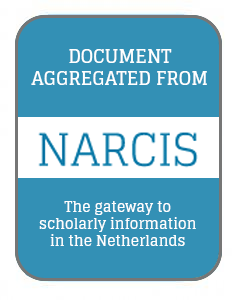Focal point
Location
National Academic Research and Collaborations Information System (NARCIS) is the main Dutch national portal for those looking for information about researchers and their work. NARCIS aggregates data from around 30 institutional repositories. Besides researchers, NARCIS is also used by students, journalists and people working in educational and government institutions as well as the business sector.
NARCIS provides access to scientific information, including (open access) publications from the repositories of all the Dutch universities, KNAW, NWO and a number of research institutes, datasets from some data archives as well as descriptions of research projects, researchers and research institutes.
This means that NARCIS cannot be used as an entry point to access complete overviews of publications of researchers (yet). However, there are more institutions that make all their scientific publications accessible via NARCIS. By doing so, it will become possible to create much more complete publication lists of researchers.
In 2004, the development of NARCIS started as a cooperation project of KNAW Research Information, NWO, VSNU and METIS, as part of the development of services within the DARE programme of SURFfoundation. This project resulted in the NARCIS portal, in which the DAREnet service was incorporated in January 2007. NARCIS has been part of DANS since 2011.
DANS - Data Archiving and Networked Services - is the Netherlands Institute for permanent access to digital research resources. DANS encourages researchers to make their digital research data and related outputs Findable, Accessible, Interoperable and Reusable.
Members:
Resources
Displaying 156 - 160 of 1863Mapping recreation as an ecosystem service: Considering scale, interregional differences and the influence of physical attributes
Methods to map nature-based recreation are increasingly used, especially in ecosystem services research and practice. Researchers that map nature-based recreation beyond local scales, however, have relied much on physical attributes, e.g. land cover and topography. In such instances the recreational potential of land is modeled based on expert judgement and not on public preferences. Participatory mapping data is based on public preferences and as such can be used to improve proxy-based methods to map the recreational potential of land.
Shifting spatial priorities for ecosystem services in Europe following land use change
Policy objectives to maintain ecosystem services are increasingly set. Methods to identify priority areas for ecosystem services can assist in the implementation of such policy objectives. While land use change is an important driver of changes in ecosystem services over time, most prioritization studies do not account for land use change or only assess negative effects. We assessed the effect of land use change on ecosystem services in Europe for a 40-year period and the subsequent consequences for identifying priority areas. We quantified five services under current and future land use.
Displacement and Land Administration. The Case of post conflict Rwanda : powerpoint
Well-being, sustainability and social development: The Netherlands 1850-2050
This open access book examines more than two centuries of societal development using novel historical and statistical approaches. It applies the well-being monitor developed by Statistics Netherlands that has been endorsed by a significant part of the international, statistical community. It features The Netherlands as a case study, which is an especially interesting example; although it was one of the world's richest countries around 1850, extreme poverty and inequality were significant problems of well-being at the time.
A post-colonial legal approach to the Chagos case and the (dis)application of land rights norms
textabstractOne way of understanding the exile of the Chagos Islanders and their inability to return to their ancestral land is through a reading of the case from a perspective of post-colonial legal scholarship. Chagossians have strong legal rights to land and remedies of compensation and return through a purposive application of the international legal definition of Indigenous, Magna Carta right to abode and international human rights law that could address their dispossession.



